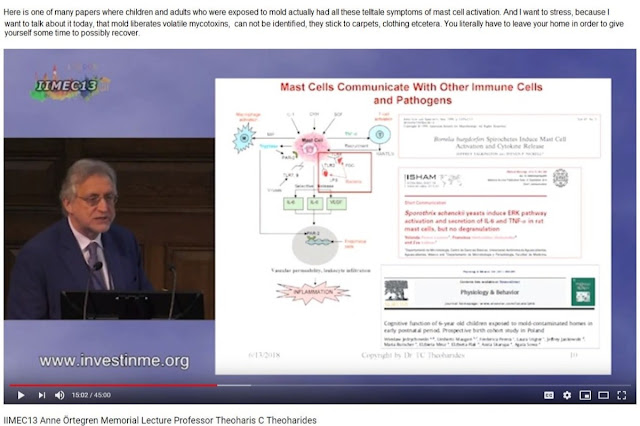https://atomicchesterton.blogspot.com/2021/04/interview-transcript-jacob-jones.html?m=1
"we had talked a lot about just our sensitivities, but there are some formal diagnoses for environmental sensitivities. One of them is, um, mast cell activation syndrome.
[02:08:23] And this is not like, might be a little bit controversial, but it is recognized by mainstream medicine. And it's where your mast cells, which are the type of innate immune, cell white blood cell involved in allergy and immune response, um, are said to overreact to various environmental triggers. Um, I was diagnosed with this before I ever did mold avoidance based on the high levels of tryptase and histamine in my blood, but also just clinically diagnosed, like based on my symptoms.
[02:08:57] Um, and then recently my sister who has also has similar reactions to mold and outdoor toxins to me was diagnosed with it. Um, and so I just wanted to point that out is just like, um, yeah, I've had that formal diagnosis, but also I took a lot of the meds for it. And while that was somewhat helpful, it wasn't anywhere near enough until I did avoidance.
[02:09:24]
Um, and uh, going to pristine areas was more help, more important to me than just staying in a bad area and taking meds to suppress my immune response. uhm...
[02:09:37] Jacob: [02:09:37] What are some of the symptoms of that?
[02:09:41] Walker: [02:09:41] Well, um, Hmm. Cause, uh, I can talk about my symptoms, but they're, they're so varied because it's just basically a syndrome that means that you have a type of almost allergy based, but it can be more neurological than a classic allergy response to like a number of, uh...
[02:10:05]Jacob: [02:10:05] it's a histamine--a histamine response, right?
[02:10:08] Walker: [02:10:08] So basically anything like, um, I would say, I mean, for me, I had skin flushing and rashes, hives, just like whenever I was inside the house
. I also had a lot of food intolerances that are less so, um, in good air, my sister and I joke that like, well, it's not really a joke so much. It's just like a funny thing that we've noticed.
[02:10:34] It's just like, it's better to be eating like fast food, like In-n-Out, which is so one of the best parts of the Southwest in the desert than to be eating like whole foods in an awful house. Um, so yeah, if you wanna heal enough to have food intolerance go away and eat In-n-Out in red rock Canyon, that's something to maybe look forward to.
[02:10:59] Um, but yeah, uh, so hives and flushing, skin reactions are part of mast cell activation syndrome. Food intolerances, um, and all of what goes with that. Um, but also brain fog, um, and fatigue. So there's a lot of overlap between the ME/CFS and chronic fatigue syndrome symptoms and heart racing. And then some people have some he-- some people go all the way up to having full blown, idiopathic anaphylaxis, where they have anaphylaxis, even to things that on an allergy test they're not allergic to.
[02:11:36] So you don't even have any predictability over where you'll, what you'll have anaphylaxis too.
[02:11:43] Jacob: [02:11:43] Wow.
[02:11:43] Walker: [02:11:43] Um, yeah, like I think, um, Simka, talked about that, right? He he's someone, um, for the listeners in our mold avoidance communities, he's been talking about having, yeah, like idiopathic, just going into anaphylaxis a lot of the time to random triggers. Um, yeah.
[02:12:07] Jacob: [02:12:07] Yeah. That's interesting. I would also, I would imagine it causes a pretty strong inflammatory response, like staying in it, like if you kept doing that, is your body kind of in a constant state of inflammation from the histamines?
[02:12:25] Walker: [02:12:25] Yeah. It's histamine, but it's not just histamine, which is why it's not just the classic allergy response. It has like...
[02:12:31] Jacob: [02:12:31] ah, interesting.
[02:12:32] Walker: [02:12:32] You can almost have like flu-like, uh, feeling because you have. Um, you have, uh, cytokines, which are like, uh, things that make they're the things released by the innate immune system that are inflammatory that make you, they're the things that when you feel like shit, when you have the flu that's cytokines, um,
[02:12:56] Jacob: [02:12:56] and it's not autoimmune?
[02:12:57] Walker: [02:12:57] ...things. Yeah. Yeah. And it is essentially a type of auto-immune
[02:13:03] Jacob: [02:13:03] ...interesting...
[02:13:03] Walker: [02:13:03] um, illness. But, um, a lot of that went away when doing avoidance. Um, I still take mast cell stabilizers and meds, but, you know, they didn't do shit when I was in off-- like a really awful, they didn't do shit when I was in a really awful environment.
[02:13:23]
You can't just expect to stay in an awful environment and necessarily be able to medicate it away, which, um, unfortunately is sometimes the mainstream."

